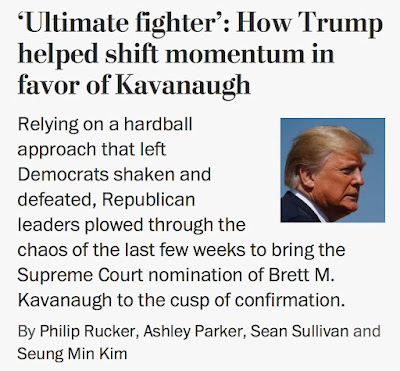... in response to something Joe Scarborough, who'd said that Trump "looks like he’s about 20 years younger than a lot of Democratic candidates" (reported at
Politico).
ADDED: Notice that Trump said "
the BRAIN is much sharper," not "
my BRAIN is much sharper." Remember,
yesterday we were talking about "the geriatric possessive," how old people tend to say "I’m going to take my bath" and "take my walk" and "take my nap" rather than referring to baths and walks and naps and so on generally, without using a pronoun to highlight that the thing in question is theirs, which is what younger people do. Look at Trump — old but not seeming old — he doesn't even say "my brain." He says "the brain."
AND: Speaking of Trump's looks, here's something from
the new Howard Stern book, from an April 2004 interview:
Caller: In a hypothetical situation—I mean, saying you’re not involved with Melania and there was no ethical backgrounds for business and whatnot—how many of those bitches [on "The Apprentice"] do you think you could’ve banged?
Howard: Good question.
Donald: Boy, I’ll tell ya. I love the thought, I’ll tell you that. ’Cause they were attractive. Do you agree with that?
Howard: I mean, some of the bodies on them while they were sitting there . . .
Donald: They were amazing.
Howard: Which is more important: talent or looking great?
Donald: Looking great.
Howard: I agree.
Donald: I’ve had both, and I’ll take looking great.
PLUS: Meade corrects my interpretation of "I’ve had both, and I’ll take looking great." He says Trump was talking about the women. I completely believed he'd switched over to talking about himself and he was looking back on the time when
he was beautiful. I read the interview last night and saw it that way and went looking for it this morning because I saw it that way, and I published the quote without even seeing the ambiguity, I was so attached to that interpretation. I now believe that he meant the women — he's "had" women — and I find that
so much less interesting.
SO: Now, I'm thinking about the word "had." You
have your own brain, whether you call it "
my brain" or not. You can use "had" to talk about the sexual partners you've had without needing to say "sex." Just say "had." To say "I've been had" means you've been tricked, and a sexual partner can be called a "trick." Of course, I look up "had" in the OED, and talk about ridiculously long entries. Try reading "have, v." It's long! I begin to laugh at myself for even trying, but then it jumps out at me:
13. transitive. a. To gain sexual possession of (esp. a woman); to have sexual intercourse with....
It goes back to Old English: "Þa het he feccan him to þa abbedessan on Leomynstre & hæfde hi þa while þe him geliste." Of course, there is Shakespeare: "Was euer woman in this humor woed, Was euer woman in this humor wonne: Ile haue her, but I will not keepe her long" ("Richard III"). Henry Fielding: "'None of your Coquet Airs, therefore, with me, Madam,’ said he, ‘for I am resolved to have you this Night.'" Keats: "I should have had her when I was in health, and I should have remained well." And — we need a woman — Judith Krantz in "Scruples" (1978): "They cherished not having had each other because it created a current of continual warmth which... was more important to them than sex." Ha, the woman is about
not having.
 It's possible that the product idea was created in response to the glorious photographs of Jill Biden seemingly flirting with Donald Trump at the Notre Dame festivities in Paris. I see news articles from 2 days ago saying that Trump had just "launched" the product. So I'm thinking first came this hilarious idea for a fake ad and then came the idea that it can be an actual product.
It's possible that the product idea was created in response to the glorious photographs of Jill Biden seemingly flirting with Donald Trump at the Notre Dame festivities in Paris. I see news articles from 2 days ago saying that Trump had just "launched" the product. So I'm thinking first came this hilarious idea for a fake ad and then came the idea that it can be an actual product.





